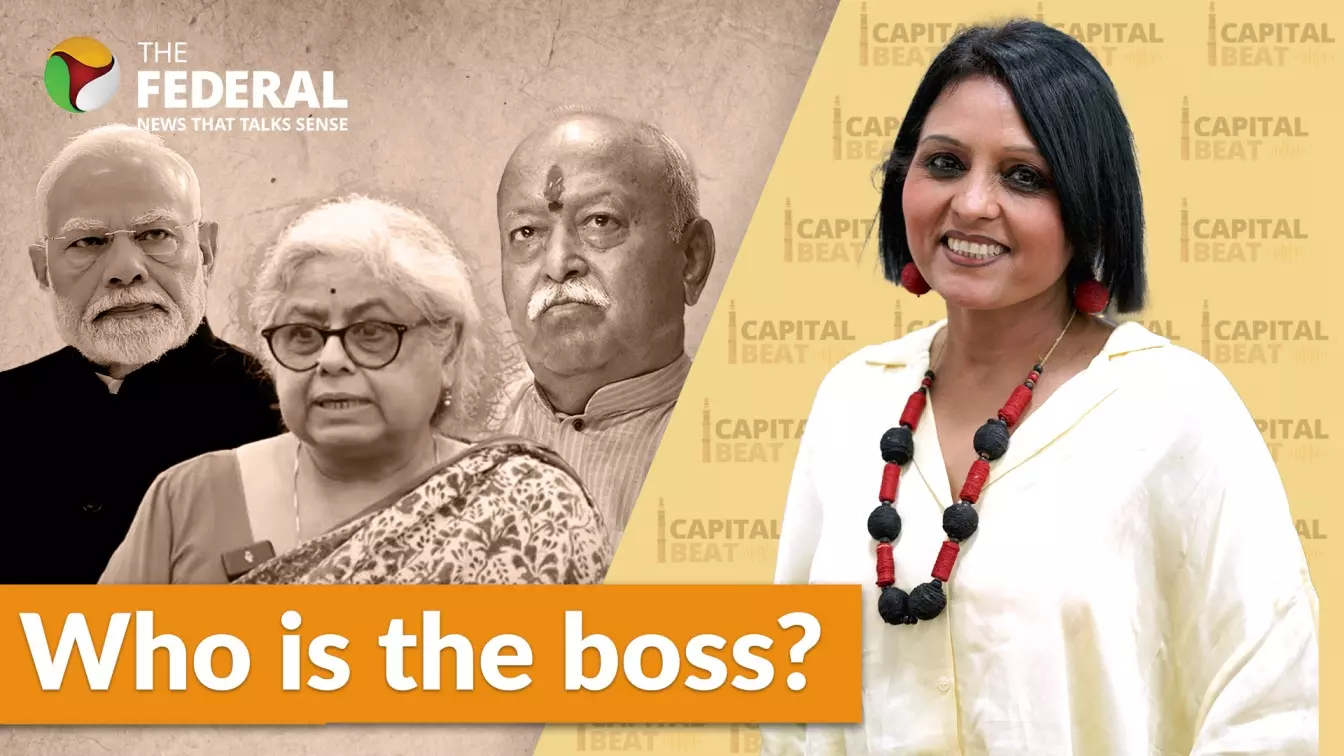
Modi visits RSS HQ
PM Modi's visit to Sangh headquarters: What to expect
PM Modi’s first visit to RSS HQ may settle the BJP president question. Will Sangh back his pick or pitch its own?

In this episode of Capital Beat, The Federal’s Neelu Vyas speaks with Aditi Phadnis, political editor of Business Standard, to unpack Prime Minister Narendra Modi’s high-stakes visit to the RSS headquarters in Nagpur on Sunday. The spotlight is on an expected but unofficial meeting with RSS chief Mohan Bhagwat, which could shape the choice of the next BJP president.
Amid speculations of growing strain between the BJP and its ideological parent, the Rashtriya Swayamsevak Sangh (RSS), this conversation dives into the dynamics of power, history, and politics within the Sangh Parivar.
Delayed BJP chief pick
The BJP president’s election, originally due earlier, has been delayed due to intervening elections and the pandemic. But insiders suggest the delay is symbolic of deeper tensions between the party and the RSS. PM Modi’s visit coincides with the start of the Hindu New Year, Vikram Samvat, and is being viewed as a peace-brokering gesture, especially with the RSS reportedly unhappy over the BJP’s growing independence.
Also read: As BJP and RSS make up, Modi to make rare appearance with Bhagwat
“Mr JP Nadda is on record saying the BJP doesn’t depend on RSS for election victories,” Phadnis pointed out. That assertion, made during the Lok Sabha polls, reportedly irked Sangh cadres, leading to reduced ground mobilisation, and eventually, BJP’s weakened tally.
Tug-of-war in the Parivar
Historically, the BJP-RSS relationship has been a push-and-pull equation, Phadnis explained. “Atal Bihari Vajpayee too faced ideological resistance from the RSS’s economic wing over liberal reforms.”
Modi, though once a pracharak himself, has governed with increasing autonomy. Yet, RSS influence persists in subtle but strong ways — from shaping BJP policy to influencing key appointments. “The BJP cannot completely ignore the Sangh,” Phadnis said, citing that the new BJP president will likely be “a consultative decision acceptable to both sides.”
RSS recalibrates
The RSS may have stayed distant during the Lok Sabha polls, but re-engaged in subsequent assembly elections, helping BJP regain momentum. Phadnis noted, “They pulled back after Lok Sabha to prevent further slide, showing the Sangh can be pragmatic.”
RSS’s concern, she said, isn’t just with power — but with values. “They are not happy with the vyaktivad — personality cult — around Modi. Yet they see his success as their own.” The visit, therefore, is not just symbolic but an attempt at resetting terms.
Modi's longevity and succession
With PM Modi turning 75 this September, whispers about succession planning and RSS’s potential role in shaping that narrative have gained traction. However, Phadnis dismissed those as premature. “There’s no hard rule on age. Mr Modi is very clear about continuing.”
She recounted a story of Modi telling a senior Rajya Sabha leader that he would ensure he’s there in the front row when Modi takes oath next time. “That speaks volumes,” she added.
Emerging Sangh agenda
As RSS prepares for its centenary, its agenda is evolving. While remaining committed to Hindu Rashtra, it now seeks to improve its outreach to minority groups like Sikhs, Jains and Parsis. “They’re unlikely to become secular as we understand the term, but they are becoming more nuanced,” Phadnis observed.
Also read: RSS passes resolution to build 'harmonious, organised Hindu society'
She also pointed to RSS’s growing vocal stance on global trade, tariffs, and Chinese relations — areas where its economic arms like Swadeshi Jagran Manch may push harder in coming years.
Looking ahead
While Sunday’s meeting between Modi and Bhagwat is not on the official schedule, its outcomes may define BJP’s next leadership chapter. Whether it leads to consensus or simply postpones tensions remains to be seen.
Asked if the media will get clarity on what transpires, Phadnis said candidly: “We will only know what they want us to know.”
(The content above has been generated using a fine-tuned AI model. To ensure accuracy, quality, and editorial integrity, we employ a Human-In-The-Loop (HITL) process. While AI assists in creating the initial draft, our experienced editorial team carefully reviews, edits, and refines the content before publication. At The Federal, we combine the efficiency of AI with the expertise of human editors to deliver reliable and insightful journalism.)

